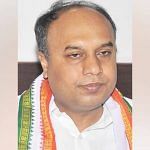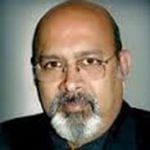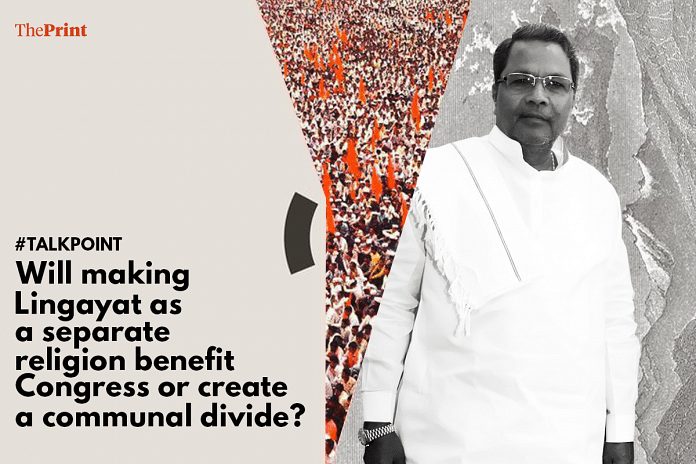The Siddaramaiah government in Karnataka has granted minority status to the Lingayat community on the recommendation of the Nagamohan committee. The proposal has been forwarded to the central government.
ThePrint asks: Will making Lingayat a separate religion benefit the Congress or create a communal divide?
Making Lingayats a separate religion is not politics, even Yeddyurappa signed the petition
 Brijesh Kalappa
Brijesh Kalappa
Spokesperson, Indian National Congress
For starters, this is not a political issue at all. If it is a political issue, then the person who initiated it, Yeddyurappa, should admit that he was politically motivated when he signed the petition as one of 27 signatories.
There is enough reason to treat Lingayats as a separate religion. They have their own practices, there are different caste groups that together form the community. Whether it is the trading class, or the oil presser, or the business class, or the baniya community, all of them come together as Lingayats. At every cross-section, these people have retained their castes as their identity within the community.
They have retained hierarchies and caste identities akin to the Hindu religion. From that point of view, Lingayat is a fit case to be considered for declaration as a separation religion. It is similar to the case of the Jains.
Over the years, several Lingayat leaders, including various religious heads, have agitated for the status of separate religion. They are aware of the benefits they are entitled to under Article 29 of the Indian Constitution. So Lingayats, who have taken several steps to educate themselves and others, are acutely aware of the benefits of being included in it. This has caused a huge upheaval within the community to establish a religion of its own.
Keeping this in mind, Siddaramaiah constituted a group of ministers, legal and sociological experts who made recommendations. Based on these, a recommendation has been sent to the Centre. Now the ball is in the Centre’s court. Let them review the issue and decide.
The Siddaramaiah govt fast-tracking the recommendations on Lingayats smacks of political opportunism
 Malavika Avinash
Malavika Avinash
Spokesperson, Bhartiya Janata Party
This is essentially political opportunism. People who see it from the outside don’t understand what the issue is inside — the division between the Veerashaivas and the Lingayats, and not Hindus and Lingayats. It is this squabble that the chief minister Siddaramaiah and (Karnataka minister) M.B. Patil are trying to make use of.
The community needs to come together as a whole as they are the stakeholders. They have to try and resolve their problems and also decide whether they want a separate religion. Until this happens, who is Siddaramaiah or Patil or politicians to interfere?
To set up a committee, which had to actually sit for six months, and the government’s decision to fast-track the committee’s recommendations, all this smacks of political opportunism. They had five full years. Siddaramaiah could have done this when he assumed office five years ago. Why now?
All of this is essentially his belief that he will be able to gain by dividing, which is not the case.
The Lingayat community needs to say whether the government is right or wrong, not the political class. They can’t be sitting and discussing this. The Lingayats constitute 17 per cent of the population and it is not a small number. Siddaramaiah can’t be taking decisions on their behalf.
This debate is not about whether one is for a separate religion; this debate is about who has to take the decision — the politicians or the community itself?
After many years of neglect, Congress is projecting itself as an ally of Lingayats
 Prithvi Datta Chandra Shobhi
Prithvi Datta Chandra Shobhi
Social historian and political commentator
The quantum of votes the Congress may receive as a result of declaring Lingayats a minority community will perhaps only be known after the elections in May. But votes aren’t the measure to assess the political dividend which may accrue to the Congress. Since the 1970s, when former chief minister Devraj Urs took away reservations from Lingayats, the Congress party hasn’t been their natural ally. Successive Congress governments weren’t seen as protectors of Lingayat interests, and the Lingayat vote substantially shifted away from the Congress. Now, by declaring them a minority community, the Congress has found a way of assuring Lingayat voters that their access to state resources is restored. This new ability to project itself as an ally is the long-term political dividend the Congress has already gained. If its share of Lingayat votes goes up even marginally in the forthcoming assembly elections, the Congress will benefit in what is turning out to be a highly competitive election.
Despite the rhetoric of ‘dharmayuddha’ by Veerashaiva pontiffs, this recommendation will not split Veerashaivas and Lingayats into two communities and create a communal divide. It shouldn’t impact the nature of social interaction within the community. Marriage alliances will not break. Nor will the performance of life-cycle rituals change. There is no evidence that anything has changed within the community. In fact, the Veerashaivas have only objected to their portrayal as non-Hindus. No Veerashaiva leader has explicitly rejected the benefits minority status will bring to the community.
Giving Lingayats special status might hurt the Congress instead of benefitting it
 Harish Ramaswamy
Harish Ramaswamy
Professor, political science, Karnatak University
This is a knee-jerk reaction. I think the government needs to consider that they do not have the correct statistical details regarding the number of Veerashaivas and Lingayats. But I have been told that the Lingayats were found to be in majority and that is why the decision was taken.
However, politically this decision may not yield the results the Congress is expecting. Many of the swamijis and the ordinary people are upset with this decision especially if they are on the other side of the fence. The move was based on a small calculation that is obviously targeted at weakening the BJP leadership in the state. But as the last two weeks have shown, the problem is much larger than that.
Instead of benefitting the Congress, this hurried decision may end up hurting it.
It is highly unlikely that the division will give rise to communal tensions. It will definitely divide the people who see the BJP’s consolidation of Hindu identity as their only option. The Veershiavas are not likely to support the Congress in this scenario.
On the other hand, it will also divide the Congress’s own voters. They now have two cabinet ministers who support this decision and hail from the Mumbai Karnataka region, and those who oppose it from different parts of Hyderabad and other parts of Karnataka. Undoubtedly, this political move has much more than meets the eye. The real story is in the caste census that the Congress is yet to divulge. We need a little more time to see how this unfolds since this needs to reach ordinary voters.
Special status may not be enough for Lingayats to move away from the BJP
 Rohini Swamy
Rohini Swamy
Associate editor, The Print
When Karnataka chief minister Siddaramaiah announced that his government was considering a separate religion tag for the Lingayats, many thought it was a master stroke on the part of the shrewd politician.
The implication was that he was hitting at the very core of the BJP’s vote bank. But things are not going easy for the Congress and it is treading on thin ice. Ministers belonging to the Veerashaiva community felt that they were being sidelined and the Lingayat ministers went about organising conventions.
Some in the party even argued that the Veerashaivas and Lingayats are two sides of the same coin and it was impossible to separate the two. Even at the all-important extended cabinet meeting to decide the issue, two young ministers argued so much that one of them was asked to leave the meeting by the chief minister.
It is this struggle within that is reflected, in some ways, in the cabinet’s decision to include not only Lingayats but also the Veerashaiva Lingayats in its recommendation to the Centre. In effect, it leaves only those Lingayats who follow the Vedic practices and those who believe that Veerashaivism pre-dates Basaveshwara out of the list of castes recommended for inclusion as a separate religion.
However, the question is whether all this will be adequate for Lingayats to move away from their trusted party, the BJP, and, more importantly, the faith the community has repeatedly placed in B.S. Yeddyurappa, the chief ministerial candidate of the BJP.
Compiled by Deeksha Bhardwaj, Journalist at ThePrint.




Whoever woke up Niddaramaih and made him do it should be taken to task.. Can we just let the CM sleep in peace until election is over…
we Hindus are oldest Dharma..none can divide us..Lingayat will be Hindu only as they worship Shiva & follow Hindu customs..Congress is dead forever